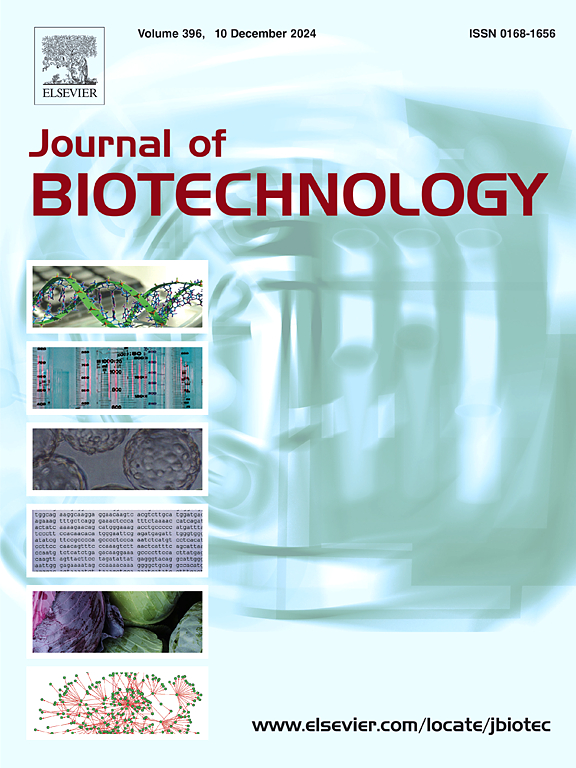pH-driven metabolic reprogramming in Bacillus velezensis 83 regulates metabolite synthesis and sporulation: A transcriptional approach for bioprocess development
IF 3.9
2区 生物学
Q2 BIOTECHNOLOGY & APPLIED MICROBIOLOGY
引用次数: 0
Abstract
Bacillus velezensis 83 (Bv83) spores are the active ingredient in Fungifree AB, an agricultural biocontrol agent whose industrial production is negatively affected by poly-γ-glutamic acid (γ-PGA) biopolymer synthesis at pH 6.8. At pH 5, γ-PGA production and sporulation are suppressed, but the latter is restored through pH-shift to 6.8 after glucose depletion. This work presents a comprehensive Bv83 spore bioprocess development through physiological and transcriptional analyses. At pH 5, Bv83 present a strategic response to pH stress by reducing its growth rate and redirecting energy towards survival rather than differentiation (downregulating lipopeptide and γ-PGA production genes) and maintaining SigB-mediated stress response rather than sporulation. Transcriptome analysis revealed downregulation of comX and phrC genes at pH 5, indicating sporulation limitation from insufficient signaling molecule production. Indeed, our results confirmed the essential role of the competence and sporulation factor (CSF) in differentiation of elongated cells into forespores. Furthermore, spent medium addition from high-cell-density cultures induced complete sporulation at pH 5, suggesting critical metabolite concentrations (besides CSF) are required. A pH-shift strategy during fed-batch cultivation suppressed γ-PGA synthesis, leading to enhanced mixing and oxygen transfer. Moreover, this strategy led to a 2.6-fold increase in spore productivity (7.86 ×1010 spores L−1 h−1) compared to a batch at pH 6.8, reducing operational costs. This research has identified pH-regulated metabolic networks, establishing a foundation for designing efficient, cost-effective industrial-scale B. velezensis fermentation strategies that comply with regulatory requirements for biocontrol applications.
ph驱动的velezensis 83代谢重编程调节代谢物合成和孢子形成:生物过程发育的转录方法
霉霉芽孢杆菌83 (Bacillus velezensis 83, Bv83)孢子是一种农业生物防治剂Fungifree AB的活性成分,其工业生产受到pH为6.8的聚γ-谷氨酸(γ-PGA)生物聚合物合成的负面影响。在pH为5时,γ-PGA的产生和孢子形成受到抑制,但在葡萄糖消耗后,通过pH移至6.8,孢子形成得以恢复。本文通过生理和转录分析,介绍了Bv83孢子生物过程的全面发展。在pH值为5时,Bv83通过降低其生长速度和将能量转向生存而不是分化(下调脂肽和γ-PGA产生基因)以及维持sigb介导的应激反应而不是产孢来应对pH胁迫。转录组分析显示,pH值为5时comX和phrC基因下调,表明信号分子产生不足导致产孢限制。事实上,我们的研究结果证实了能力和产孢因子(CSF)在细长细胞向前孢子分化过程中的重要作用。此外,从高密度培养物中添加的废培养基在pH为5时诱导了完全的孢子形成,这表明需要临界代谢物浓度(除了CSF)。在补料分批培养过程中,ph移位策略抑制了γ-PGA的合成,导致混合和氧传递增强。此外,与pH为6.8的批次相比,该策略导致孢子产量增加2.6倍(7.86 ×1010孢子L−1 h−1),降低了操作成本。本研究已经确定了ph调节的代谢网络,为设计符合生物防治应用法规要求的高效、经济的工业规模的贝氏酵母发酵策略奠定了基础。
本文章由计算机程序翻译,如有差异,请以英文原文为准。
求助全文
约1分钟内获得全文
求助全文
来源期刊

Journal of biotechnology
工程技术-生物工程与应用微生物
CiteScore
8.90
自引率
2.40%
发文量
190
审稿时长
45 days
期刊介绍:
The Journal of Biotechnology has an open access mirror journal, the Journal of Biotechnology: X, sharing the same aims and scope, editorial team, submission system and rigorous peer review.
The Journal provides a medium for the rapid publication of both full-length articles and short communications on novel and innovative aspects of biotechnology. The Journal will accept papers ranging from genetic or molecular biological positions to those covering biochemical, chemical or bioprocess engineering aspects as well as computer application of new software concepts, provided that in each case the material is directly relevant to biotechnological systems. Papers presenting information of a multidisciplinary nature that would not be suitable for publication in a journal devoted to a single discipline, are particularly welcome.
 求助内容:
求助内容: 应助结果提醒方式:
应助结果提醒方式:


